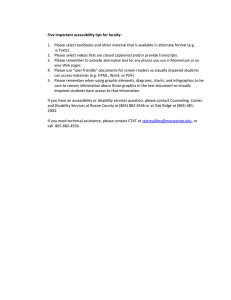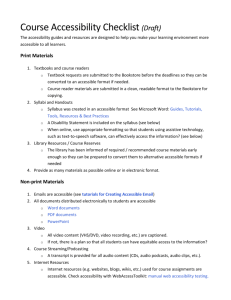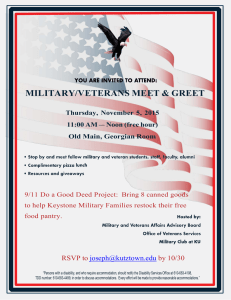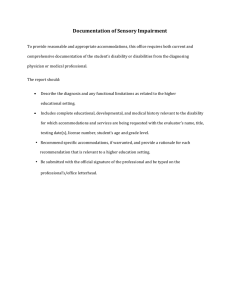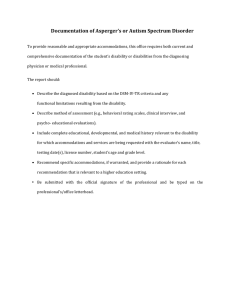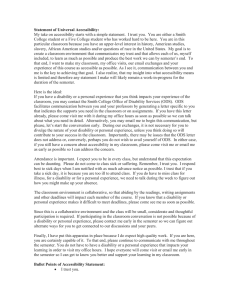Smith College Events/Meeting Access Guidelines
advertisement
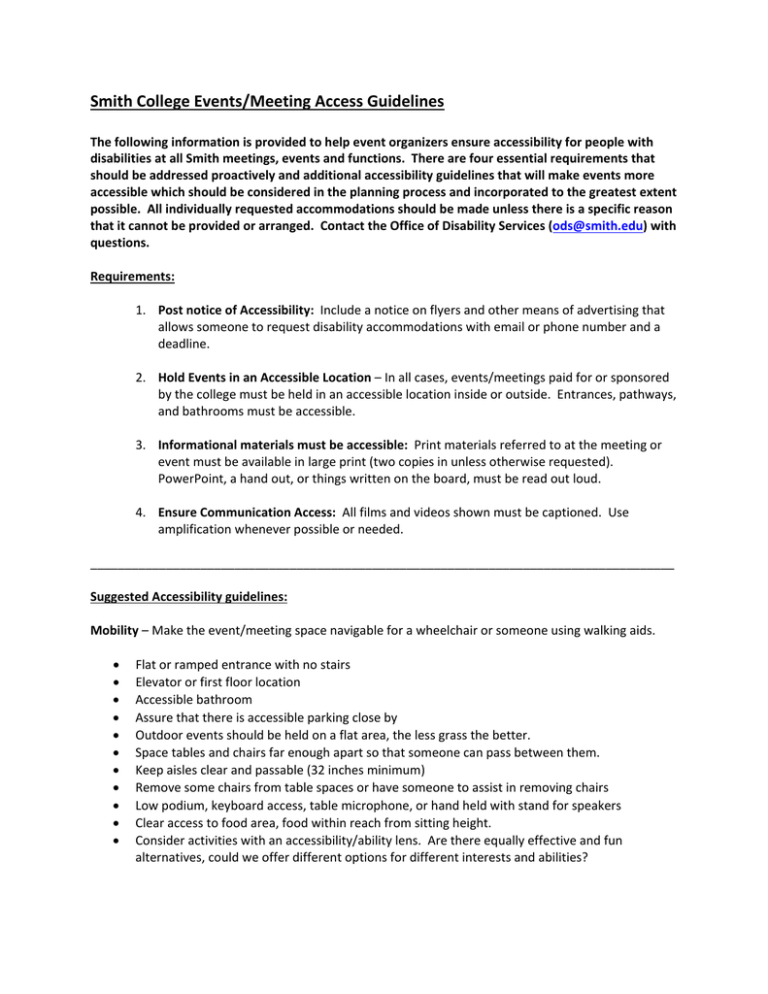
Smith College Events/Meeting Access Guidelines The following information is provided to help event organizers ensure accessibility for people with disabilities at all Smith meetings, events and functions. There are four essential requirements that should be addressed proactively and additional accessibility guidelines that will make events more accessible which should be considered in the planning process and incorporated to the greatest extent possible. All individually requested accommodations should be made unless there is a specific reason that it cannot be provided or arranged. Contact the Office of Disability Services (ods@smith.edu) with questions. Requirements: 1. Post notice of Accessibility: Include a notice on flyers and other means of advertising that allows someone to request disability accommodations with email or phone number and a deadline. 2. Hold Events in an Accessible Location – In all cases, events/meetings paid for or sponsored by the college must be held in an accessible location inside or outside. Entrances, pathways, and bathrooms must be accessible. 3. Informational materials must be accessible: Print materials referred to at the meeting or event must be available in large print (two copies in unless otherwise requested). PowerPoint, a hand out, or things written on the board, must be read out loud. 4. Ensure Communication Access: All films and videos shown must be captioned. Use amplification whenever possible or needed. _____________________________________________________________________________________ Suggested Accessibility guidelines: Mobility – Make the event/meeting space navigable for a wheelchair or someone using walking aids. • • • • • • • • • • • Flat or ramped entrance with no stairs Elevator or first floor location Accessible bathroom Assure that there is accessible parking close by Outdoor events should be held on a flat area, the less grass the better. Space tables and chairs far enough apart so that someone can pass between them. Keep aisles clear and passable (32 inches minimum) Remove some chairs from table spaces or have someone to assist in removing chairs Low podium, keyboard access, table microphone, or hand held with stand for speakers Clear access to food area, food within reach from sitting height. Consider activities with an accessibility/ability lens. Are there equally effective and fun alternatives, could we offer different options for different interests and abilities? Communication – Ensure that everyone can give and receive information effectively. • • • • • • Allow closer/reserved seating upon request Show captioned videos Speakers must face the audience and keep hands clear of their face Ask participants to raise their hand before speaking Control lots of cross talk, ask people to speak one at a time Provide a sign language interpreter or C-Print captioning upon request Visual – Ensure that information is communicated in clear and non-visual ways and that the space is navigable. • • • • • • Ask participants to say their names when they speak to allow for tracking voices Prepare handouts in larger font (16 pt.) Make handouts/information available online prior to meetings in word documents or PowerPoint and let participants know where to access the information Read aloud information written on blackboards, on news print pads, or on screen when showing slides, websites, PowerPoint presentations, etc. Give clear directions to the location, i.e. turn right after entering the building, room is 30 feet on the left down the central corridor. Use clear signage to mark functions or give directions. Have someone available to direct/escort participants to the location Allow guide/service dogs. A service dog is trained to provide assistance with certain tasks for blind or disabled individuals. Owners must remove dogs that are not well behaved. Learning/attention/Cognitive - Make information available through different modalities. • • • • • • Give clear instructions/directions Use multi-media presentations, speak, write, and demonstrate to communicate information. Allow use of a recording device Designate a note taker and send notes to participants after the meeting Make information/handouts available online prior to the meeting in Word or PowerPoint Leave time for questions! Environmental Sensitivity – Keep the environment free from unnecessary irritants, such as scents, noise, light, extreme temperatures to the extent possible. • • • • • Establish a voluntary no scents policy. Ask participants to refrain from wearing perfumes, colognes, or other heavily scented products Change a meeting location if the area has recently been painted or has new carpets Minimize background noise. Adjust light and heat controls when requested if possible depending on the situation Dietary Concerns – Provide food options that consider allergies and accessibility. • • • Offer food choices, such a gluten free options. Label ingredients in all food provided Indicate what food will be available – i.e. dinner, light refreshments, munchies, desert only • • Keep food at table level, keep napkins and utensils within reach, have straws Assist individuals to get food and remove plates when finished The Americans with Disabilities Act is a comprehensive civil rights law that is designed to end discrimination and exclusion of people on the basis of disability in our society. The ADA requires colleges to make all of their programs and activities accessible to individuals with disabilities, but its promise of equal access cannot be fulfilled unless everyone takes ownership and works to make access and full participation a reality. These basic guidelines for making meetings or events accessible should be modified to accommodate individual needs and preferences, as well as environmental limitations. While not every guideline can be followed or is needed in every circumstance, proactively providing the basics sends the message that accessibility is just the way we do business. It becomes a habit that reflects our values and allows disabled people to interact equally and seamlessly without constantly having to ask for assistance. It makes our world more accessible and accepting for everyone, as disability eventually touches all our lives. Meeting conveners/Hosts should give people a way to request more specific accommodations in advance or have a plan to put specific accommodations into place quickly if needed. Develop and communicate the process for requesting an accommodation, i.e. email, phone, and include deadlines. We are all part of the community at Smith and ultimately we need to talk and think and problem solve together so that everyone can participate as equals. If you need assistance thinking through a situation or need help providing a requested accommodation, please feel free to contact Disability Services at ods@smith.edu or call 413-585-2071. Thank you!
